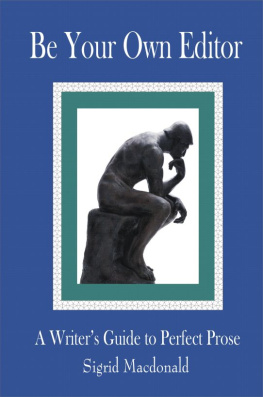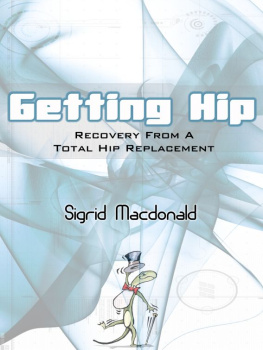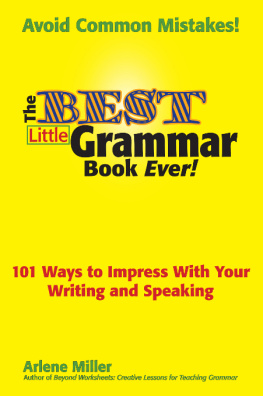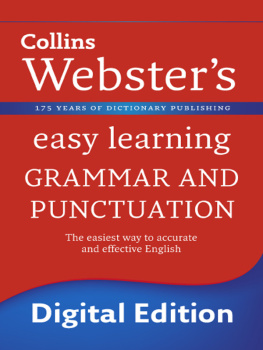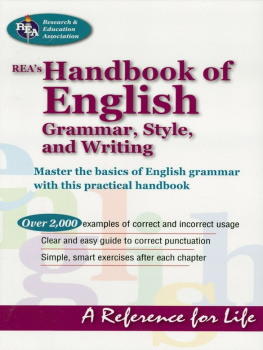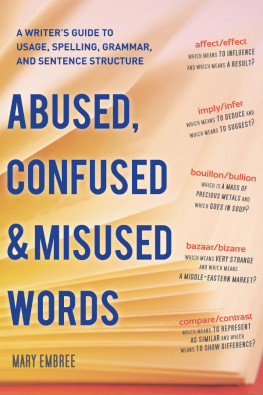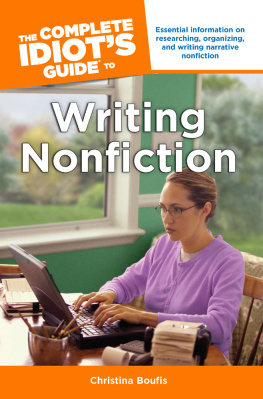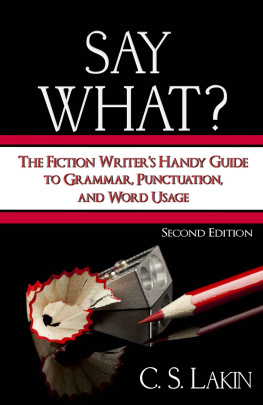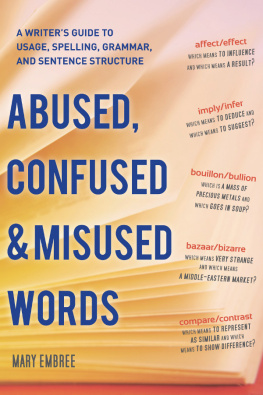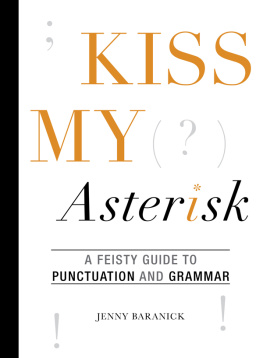Be Your Own Editor
A Writer's Guide to Perfect Prose
By Sigrid Macdonald
Copyright 2010, Sigrid Macdonald
This book is also available in print at Lulu.
ADVANCE PRAISE
Sigrid Macdonald has done aspiring and published writers alike a big favor by publishing Be Your Own Editor. Its a highly readable guide to turning a mass of words into a publishable essay, short story, magazine article or book. Anyone struggling to finish an assignment, article or chapter will find useful tips for overcoming everything from the dreaded writers block to insipid language."
Alex Binkley, journalist and 35-year member of the Parliamentary Press Gallery in Ottawa
Sigrid will mesmerize you as she spins her humor, anecdotes and good, old-fashioned, practical examples into a web of enlightenment. The best part about this book is the power it bestows by taking you from where you are right now to where you should be, inspiring and encouraging you all the way.
Sid Allcorn, author of Ordinary Woman, Extraordinary Circumstances
At last, a book that guides writers, step by step, through the wilds of the editing world AND makes it clear that writing and editing are two entirely separate jobs! Well done!!!"
Pamela McDermid, freelance writer and editor in Mexico
I spent two years writing my first book and did not notice a spelling error in the first paragraph of my query letter, until it was mailed out to over forty agents and publishers. Be Your Own Editor is a valuable resource tool for college students and newcomers to the publishing world. Sigrid Macdonald covers common mistakes and provides creative tips to bring your manuscript to its highest level.
Deborah Merlin, author of Victory over ADHD
"Very useful book, and really drives quickly through a subject that many find a snooze."
Anita Flegg, author, editor and owner of The Sharp Quill
DEDICATION
This book is dedicated to all prospective writers, new and old. May the tips in this book help to enhance your writing skills, and may you always be excited by the process as much as the byproduct of your writing.
ACKNOWLEDGMENTS
I'd like to thank my beautiful mother, Muriel, who gave me a lifelong love of literature due to her unquenchable thirst for knowledge, as well as my Uncle Magnus, who would invariably interrupt me while I was entertaining a room full of people, in order to tell me that I had used a word out of context. Then he'd leave the party, return with a five-pound dictionary, and read out loud the definition of the incorrect word that I had so hastily chosen, effectively destroying my desire to finish my story.
Moira Allen, editor of Writing-World.com, provided essential information about writing and editing on her website and in personal correspondence; in addition, she kindly brainstormed with me about the book's title.
Francine Silverman, editor and publisher of the Book PromotionNewsletter, has been a tremendous help over the years in terms of marketing advice for my previous books.
Special thanks to Elmore Hammes of POD Voice of Experience for his expert assistance, to Jesse Merlin for his brilliant contributions, and to my dear friend and colleague Cheryl Driskell, who produced the awesome cover.
I would never be an editor today without my trusted Chicago Manual of Style guidebook or my worn copy of Eats, Shoots & Leaves by Lynne Truss. My recent discovery of Mignon Fogarty, otherwise known as Grammar Girl, has made the continuing study of English a rare pleasure. She can be found at Grammar Girl: Quick and Dirty Tips.com or on iTunes. And I have great respect for the Standard Deviants DVD Library of Learning by the Cerebellum Corporation, which produces interactive DVDs on numerous academic subjects, including English composition, grammar and punctuation.
Table of Contents
Introduction
Chapter 1 Confidence Is the Key
Chapter 2 Help! Im Stuck.
Chapter 3 Substantive Editing: Polishing Fiction
Chapter 4 Substantive Editing: Polishing Nonfiction
Chapter 5 Writing Essays: Are We Having Fun Yet?
Chapter 6 My First Draft Is Finished. Now What?
Chapter 7 Common Spelling and Grammar Mistakes
Chapter 8 Punctuation: Boring but Essential
Chapter 9 Consistency
Chapter 10 Word Usage: Round up the Usual Suspects
Chapter 11 I Can Trust My Spell-check, Right?
Chapter 12 How to Perfect Whats Already Great
Chapter 13 Now Im Ready to Submit to Publishers!
Chapter 14 Can I Ever Be Grammatically Lazy?
Chapter 15 Three Years Later
Appendix
References
Index
About the Author
Introduction
Whether you are a first-time author or a seasoned writer, you have heard all the reasons why you should hire a professional editor to assess your magazine article, book proposal or manuscript before submitting it to publishers. But are they true? Of course, there are many advantages to hiring an editor but there are drawbacks as well.
To err is human but to forgive is highly unlikely in the publishing world. We all make mistakes. Unless youre a machine, chances are good that youll make many errors along the way and you wont always recognize them. Typos are easy to miss and sometimes theyre quite embarrassing.
Youve just finished a short story or a blog entry. You post it or send it off to a website for publication. Youre thrilled until you receive a call from a friend who says she got a good laugh out of the part that said the irritating neighbor in your horror piece was a paint in the neck. Duh! How did that happen? You read it over at least five times but somehow your brain skipped that part, and your spell-check missed it because the word paint is spelled properly.
A professional editor has the objectivity and clarity of mind that you will lack after spending dozens, if not hundreds, of hours on an article or manuscript. He or she will also know rules of grammar that you may not know because ideally, an editor relies on a style guide, which specifies exactly where to place a comma or how to capitalize a certain term.
But there is a downside to editors. Theyre expensive. Maybe youre a twenty-year-old student and cant possibly pay $35 an hour, or two to three dollars a page, for someone to peruse your material. Or youre a senior on a pension, on disability, unemployed or simply saving for the future. You dont want to pay for something that you could do yourself, but make sure that if you do edit your work, you have the necessary skills to do it well.
Another disadvantage to hiring editors is that often they change the meaning of your sentence, or worse, your entire manuscript! Nobody knows your content better than you. You want to retain your voice and control over your work.
For example, youve carefully written several pages describing the parents and grandparents of your romantic lead character. Your editor thinks this is a form of digression that interferes with the flow of the story; you think that its essential background information. What to do? You dont always want to kowtow to an editor.
It seems ridiculous to hire someone for a small job like a short story or a business proposal, or for an ongoing project, such as a blog. And if you're a student, it's your job to know how to write correctly. But if you have one or more typos, misspellings or grammatical errors, a publisher will hit the big delete button halfway through your material. Teachers will get out their red pencils and potential customers will shop elsewhere. Youll look like an amateur.
The same is true for bloggers who want to maintain and expand their following. We all cut some slack to nonprofit bloggers and are more merciful when they commit a grammar crime. Not so of commercial websites. Selling something? You had better spell it right or people will click away in a heartbeat. Its not that literacy per se is valued that much in our society, but rather that illiteracy, or frequent errors, suggests to the reader that you may be sloppy, careless or uneducated. And thats the last thing that you want anyone to think when they visit your site; they should be focusing on your content, products or services, not the quality of your writing. In fact, if your writing is good, no one should notice it at all. It should be a given that your site will be clear and concise, and words will be spelled properly.

